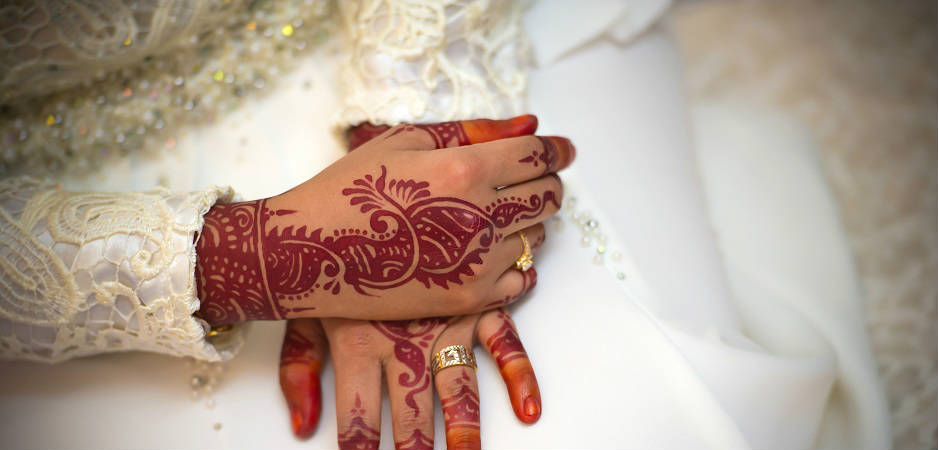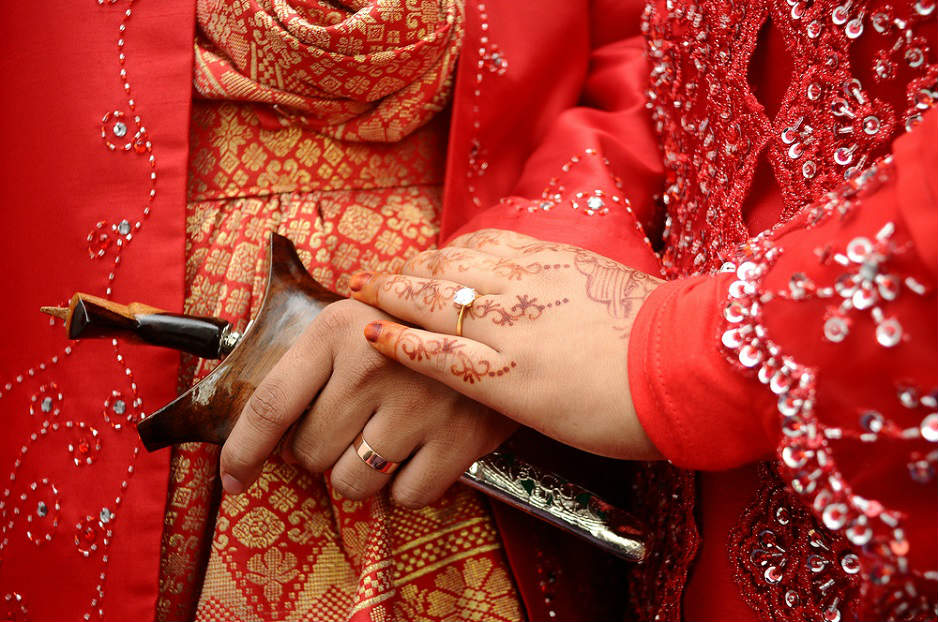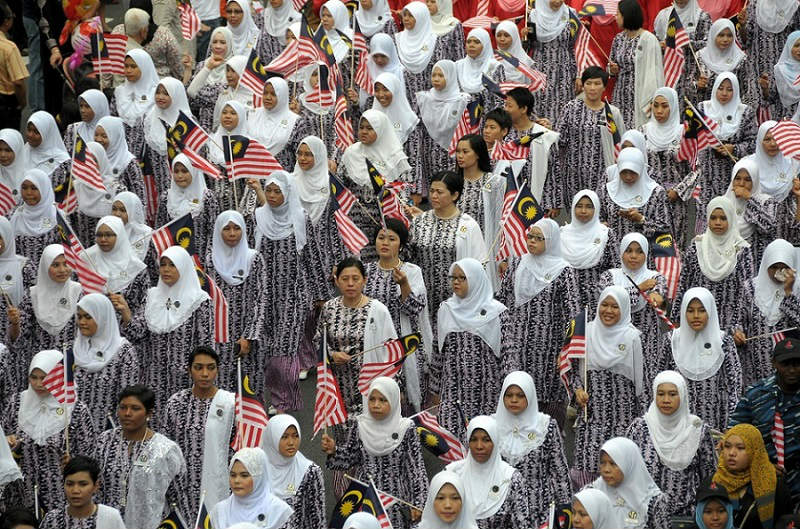Sexual sharing within polygamous marriages in urban Malaysia is a tricky business.
The sexual relationship between husband and wife is one of the most contentious aspects of life in Malay Muslim polygamous unions. It can cause great strife and misery among co-wives. At issue is husband sharing, a polygamous husband’s obligatory equal distribution of his physical attention between all his wives. As with other aspects of polygamy, what is prescribed is not necessarily what is practiced, and hence the perspectives and experiences of first and subsequent wives can differ substantially with regard to sex.
Malays technically practice polygyny – a plural marriage in which a man is permitted more than one wife at a time. In Malaysia, the right to polygamy is based on Islam, which conditionally allows a Muslim man to marry up to four wives. I use the term polygamy, however, as this is used in daily conversation and legal texts in Malaysia. Some elite Malay men have three or four wives, but it is most common for a man to have only two wives; I only refer to the first and second wife.
Sexuality’s role in elite Malay polygamy is complex, because it entails negotiations between Muslim and Malay norms, ideals and practices. In Islam, sexuality is acknowledged in both men and women, and sexual pleasure is encouraged within sanctioned marriage. In traditional Malay adat, women like men are seen as having a sexuality that a spouse has a duty to satisfy. Adat is a body of knowledge and cultural codes in accordance with which Malays order their social relations, and it involves principles of mutual needs, responsibilities and rights between men and women in marriage.
Disruptive Potential
In contemporary Malaysia, women experience various constraints regarding their sexuality through the increased importance of Islam in Malays’ everyday lives. Influenced by global Islamic resurgence, Malay women’s sexuality has become more contentious, as Islamic discourse represents women’s active sexuality as a disruptive potential that needs to be controlled. Contemporary understandings and practices of Islam limit Malay women’s control over their own bodies, as sexuality increasingly becomes tied to women’s responsibility of motherhood and notions of chastity and purity associated with it.
Curbing active female sexuality also forms part of expectations that all Malay women (and men) marry. Yet urban Malaysia, with its cosmopolitan influences, provides Malay women with new opportunities. Greater exposure to non-Muslim – especially Western – gender relations and sexuality, particularly in the media, have penetrated and shaped local discourses on sexual relations and male-female relations generally, and challenge traditionally more rigid Malay sexual mores. Urban Malay women must negotiate their sexuality within several competing discourses of desire, including polygamy.
For a Malay Muslim woman, premarital sex is considered completely unacceptable, bringing shame to the woman herself and her entire family. Parents who are otherwise liberal in religious matters tend to be strict regarding daughters’ physical intimacy before marriage, and enforce stringent measures to avoid exposing them to “risks.” Women hence cannot have sex, let alone live with boyfriends before marriage for religious and cultural reasons, as they could be arrested for khalwat.
A Malay Muslim man and woman who are not married may not be alone due to the danger of engaging in immoral acts, that is, suspected khalwat – close proximity. Premarital sex is forbidden under sharia law and can carry penalties of up to three years in prison, a fine of up to 5,000 ringgit or six strokes of the cane. Caning was previously rare in Malaysia, but it is increasing as interpretation and implementation of Islamic law is becoming more strict and less influenced by adat. In 2008, in a widely publicized case, a young couple caught “attempting” to have premarital sex were sentenced to six strokes each.
The First Wives Club
Strong sanctions against premarital sex means that many Malay women have no sexual experience upon marriage. Sexual fulfillment in marriage is recognized as important in both Malay culture and Islam, yet studies have showed that many Malay wives appear to never experience sexual relations as pleasant or fulfilling. When it comes to sex, modern Muslim women who may otherwise feel equal and not subservient to their husbands, may feel less assertive about their rights. There are, of course, numerous Malay women who find sex important and fulfilling in marriage, yet a dominant cultural narrative is that Malay women should be sexually submissive, inside as well as outside marriage.
Some first wives in polygamous unions go as far as linking their husband’s second marriage to their own lack of sexual prowess or enjoyment. Malay women, even when acknowledging that husbands must attempt to please them sexually, often feel that it is primarily the wife’s duty to please her husband. This is in line with adat understandings of women’s sexual assertiveness and pleasures. Some first wives may, therefore, partly blame themselves and their perceived sexual deficiency for the fact that their husband married a second wife.
A common discourse on Malay sexuality portrays men as having consistently strong desires which cannot be suppressed, whereas women are seen as having less consistent, more manageable needs. Malay women’s sexual desires are furthermore considered to diminish with age, so if a woman gets divorced or widowed she may not remarry, the implication being that if she does not need sex she does not need to remarry. Managing women’s sexuality as part of polygamous marriage may hence be considered appropriate: Women who are able to suppress their desires may consent to their husband marrying another wife, in order to satisfy his longing for more than they alone could give.
Many first wives, it is often argued, have few or no sexual relations with their husband by the time of his second marriage. Having regular sexual relations is often cited as a reason why men marry a new wife, even by first wives themselves. Some first wives, who have typically been monogamously married for years before their husbands marry a second wife, might simply not want to have sex with their husbands anymore, a pattern found in polygamous unions cross-culturally.
Some first wives, however, may stop having sexual relations with their husband precisely because he has married another woman. A first wife’s lack of sexual relations with her husband is as likely to be a result of her husband’s polygamy as necessarily the cause. Indeed, a man may humiliate his first wife sexually through polygamy, by implying her inability to satisfy him sexually. First wives who remain unassertive about their sexuality in marriage may, therefore, suffer greatly as they experience their husbands’ progressive neglect of them in turning his attention to his new wife.
Yet according to Malaysia’s Islamic Family Law, a Muslim man should engage in polygamy only if he can share himself equally between his wives, including sexually. Few men appear able or willing to do that, however. First wives who seem to cope physically and emotionally with polygamy might still suffer because of their husbands’ sexual relations with their other wives. Sexual jealousy is a staple part of polygamous unions cross-culturally.
Polygamy may spell celibacy for Malay women who cannot accept sharing their husband sexually with another woman, particularly if forced into polygamy by husbands marrying second wives without their consent. Yet lonely first wives, married in name only, may find having sexual relations with other men difficult in a religious and cultural context where sex is acceptable only within marriage. Some first wives refuse to remain bound by marriage vows to husbands who have married other women and act on their sexual needs. Rather than divorcing their husbands and losing all support, they may opt for affairs when abroad, where contact is easier and more discrete, or risk local affairs, despite fear of gossip and social ostracism.
“Legitimate” Sex
Second wives may perceive and experience sexuality in polygamous marriages differently than first wives. Sex may constitute a central reason for some Malay women to marry polygamously, sometimes as a “legitimate” way of conducting an affair. Traditionally, a Malay women’s sexuality should exist only in marriage, and Malay women having difficulty finding outlets for their sexual needs may feel that marriage is their only option for having “legitimate” sex.
Second wives are, in the popular imagination in Malaysia, often accused of marrying because they “need a man” or “crave sex.” So much so that they don’t care about hurting another woman whose husband they “steal.” Particularly divorced or widowed women are considered “man-eaters,” as they used to have legitimate sexual relations in marriage and are considered in special need of resuming them. Men are similarly seen as marrying polygamously for sexual gratification, but this remains less shocking and more understandable, going back to the “strong desires” to be satisfied within sanctioned marriage.
Career women, in particular, are assumed to marry as second wives for sex. The sanction against sex outside of marriage applies to all women (and men) regardless of their marital history or circumstances. Becoming second wives might fit their lifestyles, as engaging in legitimate sexual relations might be the only pressing reason why an otherwise socially and financially independent woman should marry at all. Many career women have studied or worked in Western countries, where “access” to premarital sex was easier. For women used to sexual autonomy abroad, coming back to Malaysia as single women and finding themselves forced to marry, to cohabit or conceive – or just engage in sex – can be a difficult transition.
Contentious Domain
Sexuality remains a contentious domain for contemporary urban elite Malay women, whatever their marital status. Choosing to become second wives in order to have legitimate sex may be an option for some women who feel unable to commit the time or the effort to be full time-wives, yet still crave sex and companionship. Polygamy can be a constructive time-management strategy for women prioritizing independent time for work and own interests, an argument promoted by pro-polygamists around the world. Many women discover that it is a risky strategy, fraught with potential pain and silent suffering.
Polygamous unions in modern Malaysia, rather than seeing “husband-sharing” in all aspects of marriage, see different wives getting different types of attention. The first wife may remain the husband’s official wife, sharing his public and social life, whereas the second wife may get his emotional and physical attention, leaving the first wife with a husband in name only. Yet being a second wife does not mean automatically being showered with all the husband’s affection and attention. Second wives can just as easily as first wives become neglected when their husbands’ interest in them wanes. Sometimes a husband returns to his first wife and sometimes he marries a third – or fourth – wife.
Polygamous husbands who are able to share themselves equally among all their wives certainly do exist. Yet even in such ideal cases, the emotional and contentious nature of shared sexual access to one man can cause grief and conflict among co-wives, no matter how well they seem to cope. Achieving more satisfying sex lives may be challenging in a Malay cultural context, which generally de-emphasizes sex and sexuality, resulting in lack of communication regarding sexual matters between husbands and wives. Yet as all cultural forms are malleable and dynamic, sexual sharing will continue to be negotiated in Malay Muslim polygamy.
We bring you perspectives from around the world. Help us to inform and educate. Your donation is tax-deductible. Join over 400 people to become a donor or you could choose to be a sponsor.
The views expressed in this article are the author’s own and do not necessarily reflect Fair Observer’s editorial policy.
Photo Credit: Zaini Khalili / Mohd Hasmi Hamidi / Milaphotos / Jaggat Rashidi / Shutterstock.com
Support Fair Observer
We rely on your support for our independence, diversity and quality.
For more than 10 years, Fair Observer has been free, fair and independent. No billionaire owns us, no advertisers control us. We are a reader-supported nonprofit. Unlike many other publications, we keep our content free for readers regardless of where they live or whether they can afford to pay. We have no paywalls and no ads.
In the post-truth era of fake news, echo chambers and filter bubbles, we publish a plurality of perspectives from around the world. Anyone can publish with us, but everyone goes through a rigorous editorial process. So, you get fact-checked, well-reasoned content instead of noise.
We publish 2,500+ voices from 90+ countries. We also conduct education and training programs
on subjects ranging from digital media and journalism to writing and critical thinking. This
doesn’t come cheap. Servers, editors, trainers and web developers cost
money.
Please consider supporting us on a regular basis as a recurring donor or a
sustaining member.
Will you support FO’s journalism?
We rely on your support for our independence, diversity and quality.




















Comment